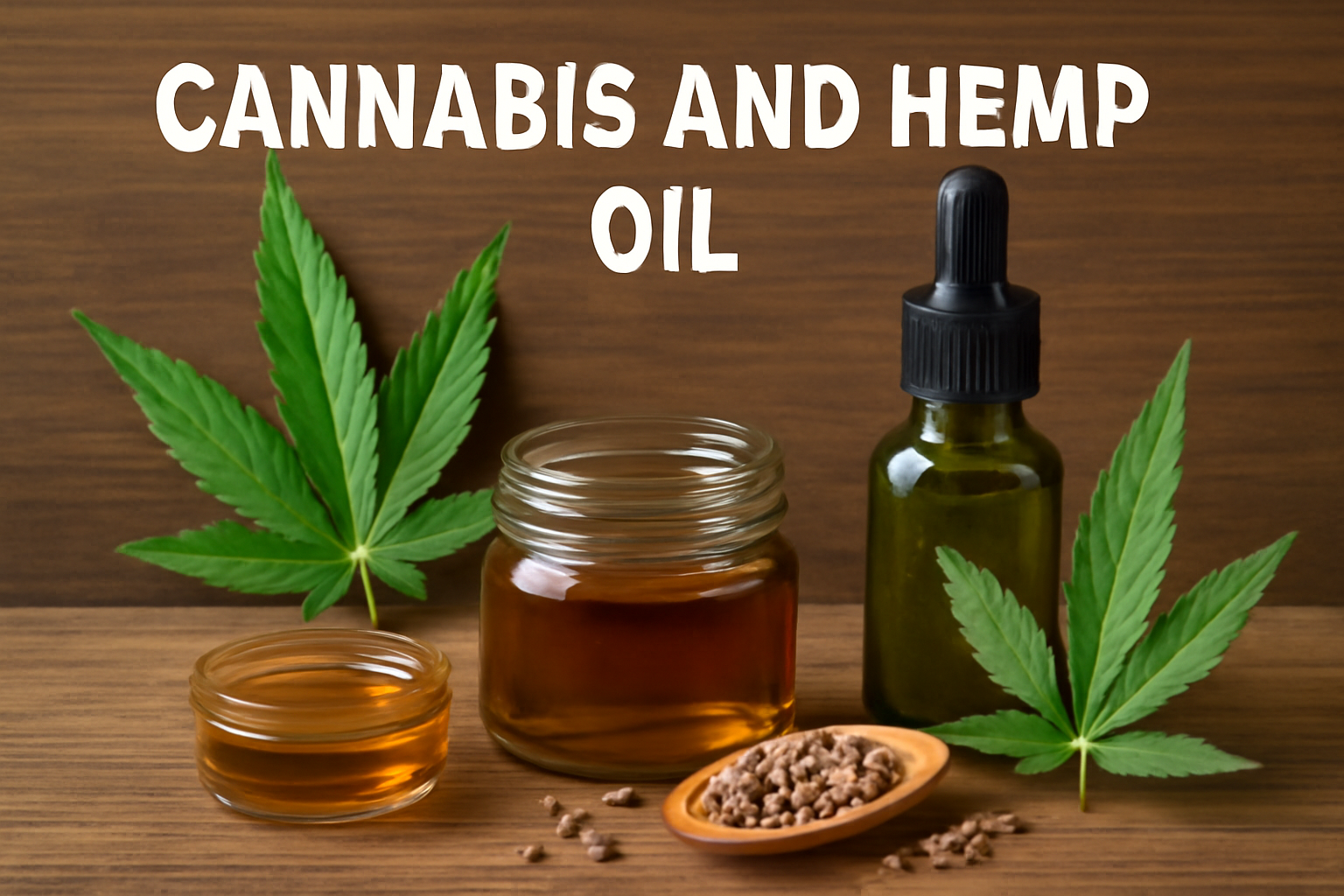Beautiful Plants For Your Interior

Cannabis and Hemp Oil: Unlocking the Power of Nature’s Healing Oils
Cannabis and hemp oil have become popular in recent years, thanks to their powerful therapeutic properties and versatility in treating a wide range of health issues. Both oils are derived from the Cannabis sativa plant but have different chemical compositions and uses. While hemp oil is often used for its nutritional and skin care benefits, cannabis oil is more commonly used for medicinal purposes, particularly to harness the effects of CBD and THC.
Cannabis and Hemp Oil In this guide, we will explore the differences and similarities between cannabis oil and hemp oil, the benefits of each, and how they can be incorporated into your wellness routine for maximum effect.
What Is Cannabis Oil?
Cannabis and Hemp Oil is a concentrated extract from the Cannabis sativa plant. Unlike hemp oil, which is made from the seeds of the hemp plant, cannabis oil is typically made from the flowers, leaves, and stalks of the plant. Cannabis oil is prized for its cannabinoid content, particularly CBD (cannabidiol) and THC (tetrahydrocannabinol), which are the two most well-known and studied compounds in cannabis.
CBD Cannabis Oil
Cannabis and Hemp Oil contains high levels of cannabidiol and is non-psychoactive, meaning it does not cause a “high.” Instead, CBD oil is widely used for its therapeutic benefits, which include:
- Pain relief: CBD has anti-inflammatory properties that help manage pain, particularly for conditions like arthritis, muscle soreness, and chronic pain.
- Stress and anxiety reduction: CBD has a calming effect, helping to alleviate symptoms of anxiety, depression, and stress.
- Sleep improvement: CBD oil can help improve sleep quality by promoting relaxation and reducing symptoms of insomnia.
THC Cannabis Oil
THC cannabis oil contains tetrahydrocannabinol, the psychoactive compound responsible for the “high” associated with cannabis. However, THC oil is also used medicinally to treat a variety of conditions:
- Pain management: THC can be effective in managing both acute and chronic pain.
- Nausea and vomiting: THC is commonly used to alleviate nausea and vomiting, particularly for cancer patients undergoing chemotherapy.
- Appetite stimulation: THC is often used to stimulate appetite in people with conditions like HIV/AIDS or cancer.
While THC does have a psychoactive effect, in moderate doses, it can be highly beneficial for pain relief and symptom management.
What Is Hemp Oil?
Cannabis and Hemp Oil, also called hemp seed oil, is extracted from the seeds of the hemp plant (Cannabis sativa). Hemp oil contains very low levels of THC (less than 0.3%), meaning it doesn’t have any psychoactive effects. Instead, hemp oil is primarily valued for its nutritional benefits and therapeutic properties, thanks to its high content of essential fatty acids, vitamins, and antioxidants.
Benefits of Hemp Oil
- Cannabis and Hemp Oil Nutritional powerhouse: Hemp oil is rich in omega-3 and omega-6 fatty acids, essential nutrients that contribute to heart health, brain function, and joint health.
- Skin care: Hemp oil is a popular ingredient in many skincare products because of its moisturizing, anti-inflammatory, and antioxidant properties. It can help alleviate conditions like eczema, acne, and dry skin.
- Support for heart health: The high levels of omega-3 fatty acids in hemp oil can help maintain healthy cholesterol levels, support circulation, and reduce the risk of heart disease.
- Anti-inflammatory: Hemp oil contains gamma-linolenic acid (GLA), which has anti-inflammatory effects and can help reduce the symptoms of conditions like arthritis and rheumatoid arthritis.
Unlike cannabis oil, hemp oil does not contain significant amounts of CBD or THC, so it is not used for its medicinal properties related to cannabinoids.
Key Differences Between Cannabis Oil and Hemp Oil
While cannabis oil and hemp oil both come from the Cannabis sativa plant, there are some important differences in their chemical composition and uses. Here are the key distinctions:
1. Cannabinoid Content
- Cannabis Oil: Cannabis oil is made from the flowers, leaves, and stalks of the cannabis plant and contains significant levels of CBD and THC. These cannabinoids are responsible for the medicinal effects of cannabis oil, such as pain relief, stress reduction, and anti-inflammatory benefits.
- Hemp Oil: Hemp oil is made from the seeds of the hemp plant and contains negligible amounts of THC. While it does contain CBD in very small amounts, it is primarily valued for its nutritional benefits rather than its medicinal properties related to cannabinoids.
2. Uses and Applications
- Cannabis and Hemp Oil: Cannabis oil is primarily used for medicinal purposes, including pain management, anxiety relief, sleep improvement, and appetite stimulation. It is commonly used in the form of tinctures, topicals, vapes, or capsules.
- Hemp Oil: Hemp oil is typically used for its nutritional benefits in cooking, supplements, and skin care products. It is commonly used as a cooking oil, in protein powders, and in cosmetic products such as moisturizers, lotions, and soaps.
3. Psychoactive Effects
- Cannabis Oil: Cannabis oil containing THC has psychoactive effects, meaning it can make you feel “high.” It is used for medicinal purposes but also for recreational use.
- Hemp Oil: Hemp oil contains very low amounts of THC, so it does not have any psychoactive effects and is safe to use without any risk of impairment.
How to Use Cannabis and Hemp Oil
Both cannabis oil and hemp oil are versatile products with a wide range of uses. Here’s how to incorporate both oils into your daily routine:
Using Cannabis Oil
- Tinctures: One of the most common methods for taking cannabis oil, especially CBD oil, is by using tinctures. These concentrated extracts are typically placed under the tongue for fast absorption.
- Topicals: Cannabis-infused creams or balms can be applied directly to sore muscles, joints, or skin for localized relief.
- Vapes: Cannabis oils can also be used in vape pens for fast, smoke-free consumption.
- Capsules: CBD and THC capsules are another easy and discreet way to incorporate cannabis oil into your wellness routine.
Using Hemp Oil
- Cooking: Hemp oil is a great addition to salads, smoothies, or as a drizzling oil over roasted vegetables. Its mild, nutty flavor complements a wide variety of dishes.
- Supplements: Hemp oil can be found in the form of capsules or soft gels as a dietary supplement for heart health, skin health, and overall wellness.
- Skin Care: Hemp oil is often used in creams, lotions, and balms for its moisturizing, anti-inflammatory, and antioxidant properties.
Which One Should You Choose: Cannabis Oil or Hemp Oil?
Cannabis and Hemp Oil, Choosing between cannabis oil and hemp oil depends on your specific needs:
- If you’re looking for pain relief, anxiety reduction, or sleep support, cannabis oil (especially CBD or THC-infused) may be the right choice for you. It’s a medicinal option that offers a powerful therapeutic effect.
- If you want to support your nutrition, improve your skin, or reduce inflammation without the psychoactive effects, hemp oil is a great option. It’s non-psychoactive and provides essential fatty acids and antioxidants that contribute to overall well-being.
Conclusion
Cannabis and hemp oil both offer unique benefits, with each playing a vital role in natural health and wellness. Cannabis oil provides powerful therapeutic effects for managing conditions such as pain, anxiety, and sleep disorders, while hemp oil is valued for its nutritional and skin care benefits, offering a non-psychoactive option for overall health.
Cannabis and Hemp Oil. When selecting the right oil for your needs, it’s important to consider whether you need the cannabinoid benefits of cannabis oil or the health benefits of hemp oil. Either way, both oils offer a natural way to enhance your well-being, promote healing, and support your overall health journey. buy Cannabis and Hemp Oil from our online store
